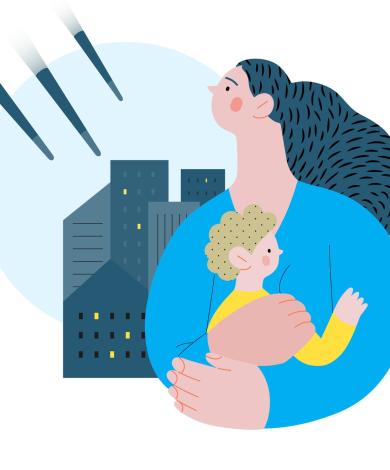CBRN emergencies are among the most alarming threats facing the world today. In modern warfare, there is increased risk of chemical, biological, radiological, and nuclear (CBRN) weapons exposure and of nuclear emergencies due to damage to nuclear power plants. Most international agencies have action guidelines for the general population, but an urgent gap exists in guidance specifically for the breastfeeding population. Before now, there was no centralised place for agencies or individuals to go to access vital information about the treatment of breastfeeding women, infants and young children and the safety of breastfeeding in CBRN crises.
In response to the lack of critical information, the Infant Feeding in Emergencies (IFE) Core Group, along with the Johns Hopkins Center for Humanitarian Health, has created guidelines for the breastfeeding population in the context of the most common chemical and biological agents along with guidance for the first three days after a nuclear power plant emergency.
Sharon Leslie, co-author of the guidance report says, "Our work was originally initiated in response to attacks on nuclear power plants and the risk of chemical and biological warfare in Ukraine. It became very clear that the information was also needed for other parts of the world and for future crises. We know that in wartime situations, women and young children are often the most vulnerable and most impacted. The guidelines help clearly address the gap that exists in protecting women and children and can be easily integrated into disaster guidelines and policies for countries and NGOs around the world."
The guidance is a multi-disciplinary effort, drawing on expertise from a wide variety of fields including medical toxicology, infant feeding in emergencies, health security, CBRN preparedness, infectious disease, disaster response, and nuclear physics, among others. The evidence-based work is intended for policymakers, healthcare workers and emergency planners and can be used alongside existing guidance for the general public and healthcare workers. This remains an evolving field and the guidance will be updated as new information is available.
Jodine Chase, Facilitator of the IFE Core Group, added, "we sincerely hope that these guidelines will never need to be used, but given the current geopolitical landscape we face, it was imperative that we had sound, easy to understand guidelines for crisis situations. In addition to guidance on specific treatment for breastfeeding women, infants and young children, the guidance details how to handle potential contamination of food that may be consumed by young children and those who are breastfeeding. All our evidence points to how much breastfeeding saves lives, particularly in disasters and emergencies. This kind of information is critical to determining when breastfeeding can be safely continued in the face of a CBRN event and ensuring that there is advice and support for those caring for infants and children that are dependent on commercial infant formula and other foods."
